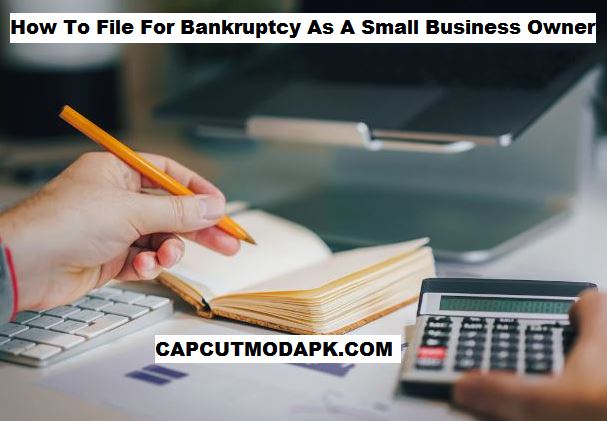How To File For Bankruptcy As A Small Business Owner: Filing for bankruptcy can be a daunting process for anyone, especially for small business owners. The pressure of mounting debts, fluctuating revenue, and operational challenges can lead business owners to consider bankruptcy as a way out. But how exactly does a small business owner file for bankruptcy, and what should they expect during the process? The path to filing for bankruptcy may seem overwhelming, but it can offer a fresh start when done correctly.
Understanding bankruptcy as a small business owner involves knowing what options are available and how each type affects your business, finances, and personal assets. Many business owners wonder whether they will lose everything if they file for bankruptcy. In some cases, bankruptcy can even protect certain assets while eliminating overwhelming debt. Knowing what disqualifies you from filing, what debts bankruptcy can discharge, and the types of bankruptcy available is key to making an informed decision.
In this article, we will guide you through the process of filing for bankruptcy as a small business owner. We will explore important considerations, such as the different types of bankruptcy, how to determine which one fits your business best, and the consequences of filing. Whether you’re overwhelmed by debt or facing a tough financial situation, understanding the bankruptcy process can help you navigate the storm and make decisions that set your business on a more stable path.
Also, READ
What Is The Difference Between Chapter 7 And Chapter 13 Bankruptcy?
What Disqualifies You from Filing Bankruptcy?
When considering how to file for bankruptcy as a small business owner, it’s crucial to understand what could disqualify you from doing so. While bankruptcy can provide relief to many individuals and businesses, there are certain requirements and restrictions to consider before proceeding.
First, not all debts are eligible for discharge under bankruptcy law. For instance, debts such as child support, alimony, and certain tax obligations are typically not discharged through bankruptcy. Additionally, you cannot file for bankruptcy if your business has recently filed in the past. For instance, Chapter 7 or Chapter 13 filings may have time limits depending on whether you previously filed for bankruptcy. These restrictions may prevent you from accessing bankruptcy protections for a certain period.
Furthermore, there are eligibility rules based on the size of your business. For Chapter 11, which is the most common bankruptcy option for businesses, there are strict income and asset requirements. If your business doesn’t meet these requirements, you may not qualify for Chapter 11 and might need to consider other options, like Chapter 7 liquidation or Chapter 13 reorganization. The specifics of each bankruptcy type and eligibility criteria can vary, so it’s vital to consult with a bankruptcy attorney to ensure you qualify.
Which Type of Bankruptcy Would Be Best for a Small Business?
As a small business owner, one of the most important decisions in the bankruptcy process is determining which type of bankruptcy to file. There are several options available, but the best choice depends on your business’s situation. The most common bankruptcy options for small business owners are Chapter 7, Chapter 11, and Chapter 13.
Chapter 7 bankruptcy, often referred to as liquidation bankruptcy, is a good option for businesses that are no longer viable and need to shut down. This type of bankruptcy allows a business to liquidate its assets in exchange for the discharge of its debts. If your business has no future prospects and you need to close it down, Chapter 7 could offer a clean break, freeing you from liabilities.
On the other hand, Chapter 11 bankruptcy is designed for businesses that want to continue operations but need restructuring. It is commonly used by larger businesses but can also be an option for small businesses. Chapter 11 allows business owners to reorganize their debts, negotiate with creditors, and keep the business running while paying off debts over time. If you believe your business can recover with the right restructuring, this might be the best option.
Chapter 13 bankruptcy, typically used by individuals, can sometimes apply to sole proprietors and small businesses with minimal assets and debt. In Chapter 13, a business owner creates a repayment plan to pay off creditors over three to five years. This is ideal for those who want to save their business but need time to catch up on past-due obligations. The choice between Chapter 7, Chapter 11, and Chapter 13 depends on your business’s financial health, the amount of debt you owe, and your goals for the business’s future.
Does Business Bankruptcy Clear All Debt?

A common question many small business owners have when considering how to file for bankruptcy as a small business owner is whether bankruptcy will clear all their business debts. The answer to this question is not always straightforward. Bankruptcy can discharge many types of debt, but not all debts are eligible for discharge. This means that even after bankruptcy, some financial obligations may still remain.
For example, bankruptcy can help eliminate unsecured debts like credit card balances, medical bills, and personal loans. However, secured debts, such as mortgages or loans backed by assets, may not be discharged unless the property is surrendered or sold. In addition, business-related debts like unpaid employee wages and some taxes may not be fully discharged, depending on the type of bankruptcy you file. It’s important to understand which debts are eligible for discharge under the bankruptcy chapter you choose.
If you’re looking for a complete fresh start with no remaining obligations, Chapter 7 bankruptcy might be your best option. However, if you’re filing for Chapter 11 or Chapter 13 bankruptcy, there may be a repayment plan in place that allows you to pay off some of your debts over time rather than discharge them completely. Understanding the limits of what bankruptcy can clear will help you make informed decisions during the filing process.
Will I Lose My Business If I File Bankruptcy?
One of the biggest concerns small business owners have when considering how to file for bankruptcy as a small business owner is whether they will lose their business. The answer to this question depends on the type of bankruptcy filed and the specific circumstances of the business.
In Chapter 7 bankruptcy, the business typically shuts down, and its assets are liquidated to pay off creditors. If you have no other option but to liquidate your business, you may have to close it down permanently. However, if you’re filing for Chapter 11 or Chapter 13 bankruptcy, your business can potentially remain open while you work through a reorganization or repayment plan. This allows you to keep your operations running while negotiating with creditors and paying off outstanding debts over time.
The key factor in whether you lose your business comes down to the type of bankruptcy you choose and how well your business can recover. If your business can be restructured through Chapter 11 or if it is viable enough to repay debts under Chapter 13, you can continue operating. But if the business is not financially sustainable, liquidation through Chapter 7 may be your only option.
What Happens to LLC If I File Bankruptcy?
For business owners with a Limited Liability Company (LLC), the question of what happens to the LLC if they file for bankruptcy is a valid concern. When a business owner files for bankruptcy, the structure of the LLC itself doesn’t necessarily change. However, the financial standing and liabilities of the LLC will be affected depending on the type of bankruptcy filed.
If your LLC is a separate entity, its debts may be discharged through Chapter 7, and the business could be shut down. However, if the LLC is not entirely separate from the owner (as in the case of a single-member LLC), personal assets could be at risk. In Chapter 11 or Chapter 13 bankruptcy, the LLC can remain in operation if the business can repay its debts through a restructuring plan or payment plan.
For small business owners with LLCs, one of the key benefits of bankruptcy is the potential to protect personal assets from business liabilities. However, this protection can be limited if personal guarantees were made for business loans or if the LLC’s operations mix personal and business finances. Consult with a bankruptcy attorney to fully understand the implications for your LLC.
Am I Personally Liable for LLC Debt?
One of the major benefits of operating as an LLC is that owners are generally not personally liable for the business’s debts. However, there are exceptions to this rule. If you personally guaranteed loans or co-signed for credit, you could be held personally liable for those debts. In addition, if you engaged in fraudulent activities or failed to follow proper business procedures, a court could pierce the corporate veil and hold you personally responsible.
If your LLC faces financial difficulties and you file for bankruptcy, the business’s debts will typically not affect your personal assets unless you are personally liable for certain debts. In the case of Chapter 7 or Chapter 13 bankruptcy, personal liability depends on the specific debts tied to your personal guarantees. If you are not personally liable for the debts of the LLC, filing for bankruptcy can protect your personal assets from being seized to cover the business’s debts.
If you’re unsure whether you are personally liable for your LLC’s debt, it’s important to review your business contracts, loan documents, and guarantees. Consulting with an attorney can help you understand your potential personal liabilities before proceeding with bankruptcy.
Conclusion
Filing for bankruptcy as a small business owner may feel like the last resort, but it can provide much-needed relief in difficult times. By understanding the different types of bankruptcy, knowing what debts will be cleared, and realizing the potential impact on your business, you can make a more informed decision about how to file for bankruptcy as a small business owner. Whether you are looking to restructure or liquidate, the key is to assess your options carefully and consult with an experienced bankruptcy attorney to guide you through the process.
Remember, bankruptcy is not the end of the road, it’s a tool to help you reset and rebuild. By taking the necessary steps and understanding the legal process, you can give your business the best chance at recovery or a fresh start.


